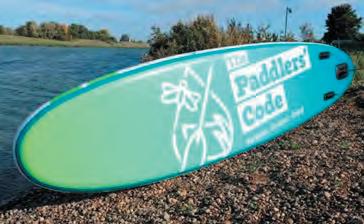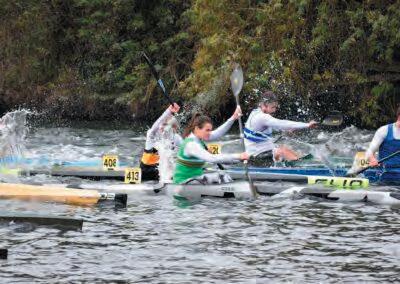
4 minute read
British Canoeing Page
23
national significance in December 2020. Other examples of projects of national significance might be a wind farm, airport expansion or new rail line. Projects of national significance require a type of consent known as “development consent order” (DCO). A DCO removes the need to obtain many separate consents, including planning permission and is designed to be a quicker process than applying for these separately. The DCO must be granted before full funding is approved and construction can begin.
Design development
We're currently in the pre-application stage, meaning we're doing all the work ready to make the application. The final scope and design of the project, which we will ultimately prepare a development consent application for, is yet to be fully determined. It will be shaped by technical, environmental and economic factors alongside consultation feedback.
British Canoeing
Paddlers Code
The Paddlers’ Code (https://paddlerscode.info/#respect ) is a new guide for paddlers developed in partnership with paddlers and Natural England and their work with the Countryside Code . British Canoeing had considered it timely with the large numbers of newcomers in paddlesport to provide a range of best practice advice to Respect, Protect and Enjoy the waterways.
The code advises on:
Safety - wearing a buoyancy aid, equipped for the trip and within your capabilities, adhere to navigation rules, check the weather and having the appropriate leash for the environment if paddling a Stand Up Paddleboard(SUP). Keeping group sizes small and discreet, avoid damaging fences and walls when lifting crafts over them and generally being respectful to those you meet along the water.
Environment - protect nature, paddlers are asked to avoid dragging boats on river banks and to avoid gravel beds, which can be important spawning grounds for fish.
Bio-security – the guide reminds paddlers to check, clean and dry their kit after each trip. This is key to helping stop the spread of invasive, non-native species.
Hasler Trophy National Kayak Race
More than 600 paddlers participated in this major canoeing calendar event on the River Thames at Runnymede Recreation Ground on 25th September. The event was jointly co-hosted by Addlestone Canoe Club and Wey Kayak Club from

24
Guildford. The Hasler Trophy is named after Lieutenant Colonel “Blondie” Hasler RM, who led the “Cockleshell Heroes” raid on Bordeaux Harbour. The event is an interclub Marathon discipline competition that brings together clubs who have qualified in their local areas for a place in the final. Lower Ranking List paddlers take a four-mile course in the morning. In the afternoon higher ranking paddlers including GB team members take a 12-mile course to Old Windsor Lock. This year Elmbridge Canoe Club from Weybridge was awarded the Hasler Trophy. For bio security measures British Canoeing provided a Check Clean Dry facility for kayaks leaving the water and also arranged litter picks for a minimal impact on the area.
Abbey River 30 years on
Next year marks the 30th anniversary of the rally organised in 1993 by Tony Davis of IWA Guildford and Reading Branch to celebrate the NRAs installation of the Abbey Chase boat rollers that had officially opened up the side stream to through passage by light craft. 30 years later the waterway that has a public right of navigation is obstructed by an illegal dam first reported to the EA in 2018 and several times since. In this period the stream has been further obstructed by fallen trees and dense weed growth. The Thames Conservancy Act 1932 empowers the navigation authority to take enforcement action to have the illegal structure removed and other obstructive vegetation and trees to be removed by the landowner. The side stream is no longer a through channel between Penton Hook and Chertsey Weir pool and needs to be restored for the passage of small craft. Unfortunately a 30th anniversary event in 2023 is not possible. An IWA member has remarked “were this possible it would have been a fitting tribute to Tony as well as being beneficial in exercising the public right of navigation” .

Floating Pennywort Removal
The EA, British Canoeing, and Angling Trust with their members arranged more events in September and October clearing this non-native species with conservation groups and local residents on the River Wey and River Mole. Work on the River Wey has been between Papercourt Lock and Pyrford Lock. A recent development in a channel off the navigation is the site of a pilot scheme where a weevil has been introduced to combat floating pennywort. On the River Mole a section of the river by Island Barn Reservoir is being tackled. Weather conditions over recent months has seen the rapid growth of the aquatic plant and more events are proposed for 2023. On the River Thames sightings of infant floating pennywort rafts have only become obvious this year between Hampton Court and Weybridge and reported to the EA.









